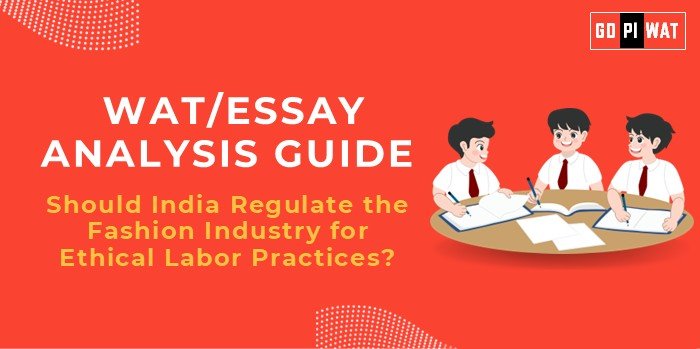📋 Written Ability Test (WAT)/Essay Analysis Guide: Should India Regulate the Fashion Industry for Ethical Labor Practices?
🌐 Understanding the Topic’s Importance
💡 The essay explores the intersection of ethics, economics, and labor rights in a high-growth industry. Its implications for B-schools include CSR, international business, and sustainable practices.
📝 Effective Planning and Writing
- ⏳ Time Allocation:
- 📋 Planning: 5 minutes
- ✍️ Writing: 20 minutes
- 🔍 Review: 5 minutes
- 📚 Structure:
- 📜 Introduction: 60-70 words
- ✒️ Body Paragraphs: 350-375 words
- 📄 Conclusion: 60-70 words
✨ Introduction Techniques for Essays
- ⚖️ Contrast Approach:
“While India’s fashion industry contributes 7% to GDP, it also employs millions under exploitative conditions.”
- 🔧 Solution-Based:
“Ethical labor regulation can balance economic growth with sustainable worker rights.”
- 📜 Historical Perspective:
“India’s garment sector has thrived for decades, but ethical labor practices remain a persistent challenge.”
📚 Structuring the Essay Body
- 🏆 Achievements:
- 🌟 Highlight the growth of ethical brands and policy initiatives like labor codes.
- 📚 Include examples like the Tirupur cluster’s transformation.
- ⚠️ Challenges with Comparative Analysis:
- 🔍 Discuss weak enforcement and supply chain issues.
- 🌍 Compare with Bangladesh and China’s approaches.
- 🌟 Future Outlook:
- 📋 Recommend steps like phased implementation, digital tracking of labor conditions, and consumer awareness programs.
📄 Concluding Effectively
- 🤝 Balanced Perspective:
“India must regulate labor practices to ensure ethical growth while maintaining global competitiveness.”
- 🌍 Global Comparison:
“Drawing lessons from Bangladesh and China, India can lead in ethical fashion by balancing regulation with economic incentives.”
💡 Recommendations for Sustainable Progress
- ⚖️ Implement a phased regulatory framework.
- 🤖 Leverage technology for supply chain transparency.
- 🤝 Strengthen public-private partnerships for worker welfare.
✍️ Sample Short Essays (100 words each)
⚖️ Balanced Perspective
“India’s fashion industry, employing 45 million workers, is an economic powerhouse. However, ethical concerns like poor wages and child labor tarnish its reputation. Balancing regulation and economic growth is key. Initiatives like labor codes and international collaborations must be expanded, ensuring a fair yet competitive market.”
🔧 Solution-Oriented
“Ethical labor regulation in India’s fashion sector is imperative. By adopting phased policies, leveraging digital tools for transparency, and prioritizing worker welfare, India can address global consumer demands and sustain its economic edge.”
🌍 Global Comparison
“India can emulate Bangladesh’s ethical labor strategies and China’s technological advancements to lead in sustainable fashion. A robust regulatory framework will not only enhance worker welfare but also secure India’s global market position.”


